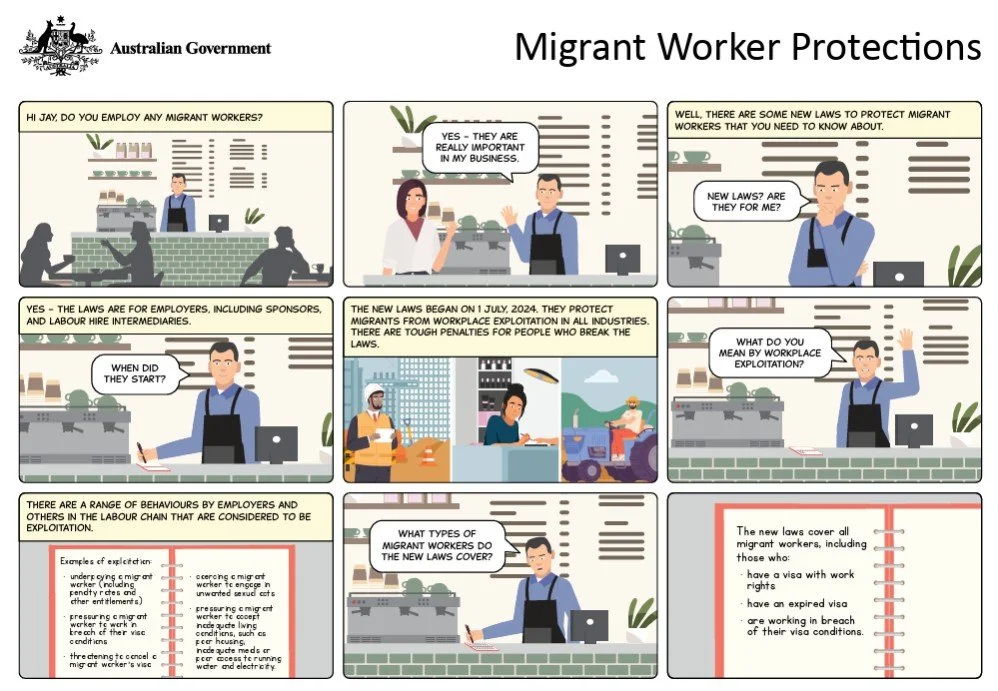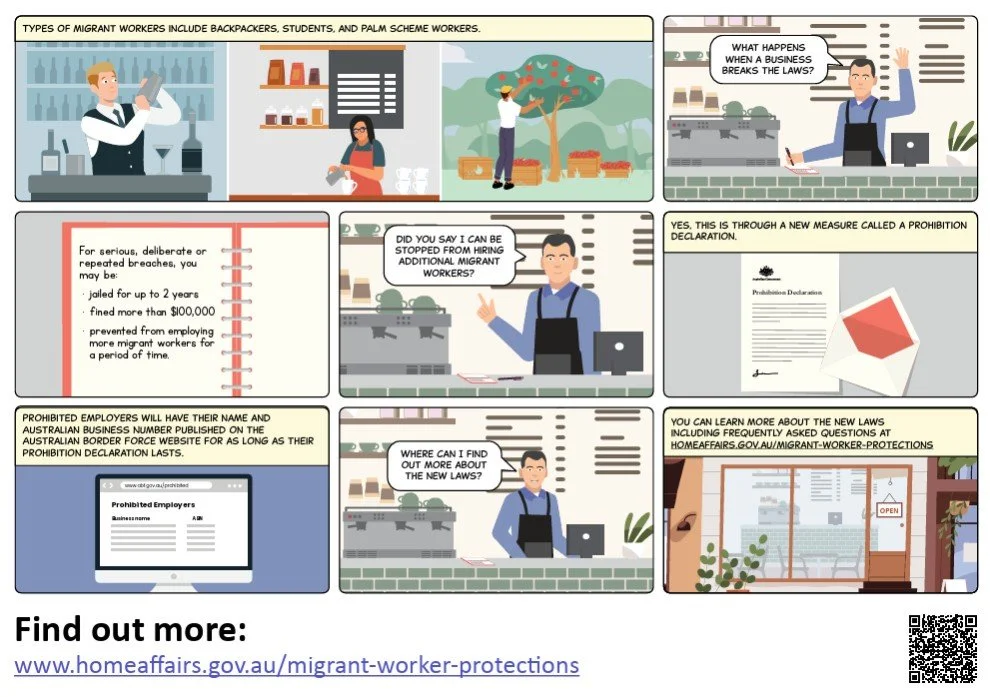Workplace Rights in Australia
Do you know your workplace rights in Australia?
In 2024, the Australian Government introduced new laws to strengthen protections for migrant workers and address migration worker exploitation in Australia, to ensure that all workers in Australia, regardless of visa status, are treated fairly and have access to workplace justice.
In particular, three (3) new work-related offences were implemented, making it illegal for employers (including sponsoring employers) and labour-hire businesses to:
coerce or pressure a temporary visa holder to breach a work-related visa condition
coerce or pressure a non-citizen without a valid visa to accept or agree to a work-related arrangement
use a worker’s temporary visa status to exploit them in the workplace (including in relation to existing visa conditions and requirements to support future visa application)
Additionally, a new Workplace Justice visa was introduced, allowing migrant workers who have been exploited at work to extend their stay in Australia to resolve the issue.
The Department of Home Affairs has recently published a Guide to Workplace Rights in Australia, answering the following commonly asked questions:
Who has workplace rights in Australia?
Australian workplace laws protect workers whose primary place of work is in Australia, or workers who are employed by an Australian employer. Workers do not have to be an Australian citizen or permanent resident to be protected by Australian workplace laws. Visa holders have the same basic workplace entitlements and protections as all people working in Australia. Contracts or agreements cannot take these entitlements away.
Where can I go for help?
The Fair Work Ombudsman (FWO) enforces Australian workplace laws. The FWO has helpful online tools where you can check your pay and wages and use a pay calculator. You can quickly and easily record your work hours using the Record My Hours app - Fair Work Ombudsman. If you are worried that your employer is not treating you fairly or is not obeying Australian workplace laws, you can contact the FWO for information, advice or help. You can call them on 13 13 94. You might also be able to get free legal help from other organisations, such as legal aid, a community legal centre or a union.
What about my visa?
Your employer cannot cancel your visa, even if you have breached your visa conditions. Only the Department of Home Affairs (Home Affairs), including the Australian Border Force (ABF), can grant, refuse to grant, or cancel visas. The Australian Government has introduced laws that help to protect visa holders experiencing workplace exploitation. These new protections are part of a Strengthening Reporting Protections Pilot. You may be eligible for the pilot if you are on a temporary visa with permission to work.
If you are a temporary visa holder who is not allowed to work, Home Affairs will consider your case on its merits. If you are eligible for the pilot, Home Affairs will not cancel your visa if:
You have breached a work-related visa condition, and
There is a link between that visa breach and a workplace exploitation matter, and
Provided a number of other conditions are met.
To access the new reporting protections, you must:
Have your workplace exploitation matter certified by either a participating government agency or an accredited third party before notifying Home Affairs
Outline the connection between the workplace exploitation matter and the breach of visa condition, and
Commit to complying with your visa conditions in the future
To notify Home Affairs of your workplace exploitation, you can complete the Strengthening Reporting Protection Request Process form.
What are my workplace rights?
There are rules in Australia about the rights you have at work, such as the minimum amount you can be paid (as of 1 July 2024 the current national minimum hourly wage for adult full time and part time workers is $24.10 an hour), the maximum hours you can be required to work and how often you have to be given a break. These rules can be found in different places such as an award or registered employment agreement (such as an enterprise agreement), or an employment contract. Visa holders have the same basic entitlements and protections as other Australian workers under the Fair Work Act 2009 (Cth).
These include:
Pay and wages – for example, as of 1 July 2024 the current national minimum hourly wage for adult full time and part time workers is $24.10 an hour. Minimum pay rates are usually updated yearly. Protection from being unfairly dismissed (‘fired’ or ‘sacked’) in some circumstances. If you think you may have been unfairly or unlawfully dismissed, you have 21 days to make a claim with the Fair Work Commission. Rules and exceptions apply. You should get advice on this straight away.
Protection from discrimination (treated badly) for exercising a workplace right – for example, taking leave when unable to work due to illness or injury, or making a complaint or enquiry about their employment.
Protection from sexual harassment and bullying at work.
Protection from discrimination – this includes protection from unlawful discrimination on the grounds of age, disability, sex, race, sexual orientation and faith.
It is important to comply with the conditions of your visa. If you have any concerns about your ability to meet your visa conditions you should discuss these with a registered migration agent (RMA) or legal representative or contact the Department of Home Affairs. However, you have entitlements and protections under workplace laws regardless of your migration status. This includes situations under the Migration Act when you:
Have breached a condition of your visa,
Do not have the right to work in Australia under the conditions of your visa, or
Do not currently hold a visa.
What are signs of workplace exploitation?
Exploitative behaviour can include a range of situations where an employee is being mistreated at work. This can take many forms, such as:
Threats to cancel your visa.
Being forced to work.
Working excessively long hours.
Wage underpayments and unpaid training.
Failure to provide payslips.
Unfair deductions from wages (i.e. for accommodation, training, food or transport), deposits or ‘cash-back’ schemes.
Not receiving workplace entitlements, for example, paid leave including sick and annual leave or superannuation.
Having your passport taken and held by someone else.
Pressure to work beyond your specified visa conditions.
Pressure to make an up-front payment or ‘deposit’ for a job.
Employers avoiding paying tax by paying you in cash.
Being classified as an independent contractor instead of an employee.
Working in unsafe conditions.
Your employer providing you with poor quality accommodation to live in, including forcing you to pay for that accommodation.
Not being allowed to leave the workplace.
Pressure not to join a union.
Workplace exploitation occurs when workplace rights and obligations are not known, understood or complied with by employers, either inadvertently or deliberately.
How do my visa conditions impact my workplace rights?
Your Australian visa may include conditions relating to the work that you can or cannot perform. An employer may reasonably direct you to undertake, or not undertake, activities as a result of these visa conditions. For example, if your visa conditions only permit you to work in a certain occupation, your employer may direct you to only work in that role. Your visa grant letter will include information about any conditions that apply to your visa. Alternatively, you can check your visa details, including your visa conditions, through Visa Entitlement Verification Online: Visa holder enquiry (immi.gov.au) (VEVO) on the Department of Home Affairs website. If you engaged an RMA or legal practitioner, they can also provide you with guidance about your visa conditions.
Where can I get more information?
For more information about workplace rights for visa holders and migrants, the Fair Work Ombudsman has published information on its website about protections for migrant workers and can be contacted for free advice, education and help to all employees so they can understand their workplace rights.
You can also review the National Employment Standards in Australia, which are the minimum employment entitlements that apply to most workers in Australia.
The Fair Work Information Statement (FWIS) also contains information about the National Employment Standards (NES) and other minimum entitlements, and this should be provided to al new workers by their employers.
Need help with your immigration matter?
Our immigration lawyers at Inclusive Migration have extensive experience in advising on employer sponsorship obligations and assisting sponsored overseas workers who have been subjected to migrant exploitation in Australia. If you wish to discuss your options, please do not hesitate to contact us by email at info@inclusivemigration.com.au, through our contact form or by sending us a message on WhatsApp.


